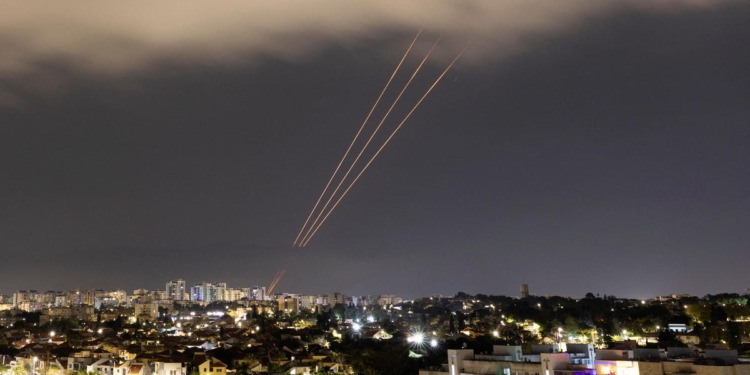Iran has no intention of continuing its military operation against Israel, which included massive drone and missile strikes over the weekend, the chief of staff of the Armed Forces, Major General Mohammad Bagheri, has said.
On Saturday night, Tehran launched an “extensive” barrage on the Jewish state, which the Israel Defense Forces (IDF) estimated to have included more than 300 missiles and kamikaze drones. The attack came in retaliation for what Iran claims to be an Israeli airstrike on Tehran’s consulate in Damascus, Syria earlier this month, which killed several senior Iranian military officers.
Speaking in the wake of the attack on Sunday, Bagheri explained that the reason for the attack was the “Zionist regime crossed the red line” in a way which cannot be tolerated.
Israel’s actions, the general continued, could not have gone unanswered. “The Supreme Leader also said that this punishment should be carried out and, thank God, this operation was carried out with the efforts of the [Islamic] Revolutionary Guards [Corps] and the help of other armed forces.”
“We see this operation as a complete result, and this operation has ended in our opinion, and we have no intention of continuing the operation,” Bagheri said, warning Israel that if it takes any further action against Iran, “the next operation will be much more extensive.”
The chief of the General Staff added that Iran’s military targeted a “large information center” that provided intel to Israel and Nevatim Airbase, which it said hosted US-designed F-35 fighters involved in the raid on the consulate in Damascus.
Iran has massively advanced its nuclear program since the Trump administration pulled out of the 2015 nuclear deal. It is the only non-nuclear weapons country to produce 60% enriched uranium and has enough near weapons-grade nuclear fuel for around three bombs.
While both of these bases were destroyed, Tehran did not attack population centers, the general claimed. Israel, however, previously said that 99% of the Iranian drones and missiles had been shot down, acknowledging only minor damage to one base.
US President Joe Biden will meet with G7 leaders Sunday “to coordinate a united diplomatic response to Iran’s brazen attack,” according to a statement released by the White House.
“My team will engage with their counterparts across the region. And we will stay in close touch with Israel’s leaders,” the statement from Biden reads. “And while we have not seen attacks on our forces or facilities today, we will remain vigilant to all threats and will not hesitate to take all necessary action to protect our people.”
US defensive assets moved to the region earlier this week and “helped Israel take down nearly all of the incoming drones and missiles,” according to the statement.
Biden also spoke to Israeli Prime Minister Netanyahu following Saturday’s attack “to reaffirm America’s ironclad commitment to the security of Israel.”
I told him that Israel demonstrated a remarkable capacity to defend against and defeat even unprecedented attacks – sending a clear message to its foes that they cannot effectively threaten the security of Israel,” the president wrote.What happened in Damascus and why is it important?
As we’ve been reporting, Iran had long been warning that it would launch an attack on Israel in retaliation to a strike on the Iranian consulate building in Syria’s capital, Damascus, earlier this month. As a reminder, here’s how that attack unfolded:
- Syria’s defence ministry said Israeli aircraft targeted the Iranian consulate building, which was on a highway in the western Mezzeh district of Damascus, from the direction of the occupied Golan Heights
- Syrian air defences shot down some of the missiles they launched, but others made it through and “destroyed the entire building, killing and injuring everyone inside”, the ministry added
- The strike killed seven of Iran’s Islamic Revolution Guard Corps (IRGC) officers, including top commanders Brig-Gen Mohammad Reza Zahedi and Brig-Gen Mohammad Hadi Haji-Rahimi
- Israel has neither confirmed nor denied the attack, saying it does not not comment on foreign media reports
- However, Israel has acknowledged carrying out hundreds of strikes in recent years on targets in Syria that it says are linked to Iran and allied armed groups which are armed, funded and trained by the Revolutionary Guards
- Israeli strikes have reportedly been stepped up since the start of the war in Gaza in October last year, in response to cross-border attacks on northern Israel by Hezbollah and other Iran-backed groups in Lebanon and Syria
- Syria’s Foreign Minister Faisal Mekdad said he strongly condemned what he called “this heinous terrorist attack”, adding that it had killed “a number of innocent people”
Russia said it need no longer obey U.N. Security Council restrictions on giving missile technology to its ally Iran once they expire on Wednesday, without saying whether it now planned to support Tehran’s missile development. “Supplies to and from Iran of products falling under the Missile Technology Control Regime no longer require prior approval by the U.N. Security Council,” Russia’s foreign ministry said in a statement last year. The restrictions were defined in Resolution 2231 of 2015 endorsing a deal by which Britain, China, the European Union, France, Germany, Russia and the U.S. removed sanctions against Iran in return for Tehran curbing its nuclear programme. In 2018, then-President Donald Trump withdrew the U.S. from the deal, known as the JCPOA, leaving unilateral U.S. sanctions in place, and Iran subsequently accelerated its nuclear programme, which it says is purely peaceful.RT, CNN, BBC






























Discussion about this post